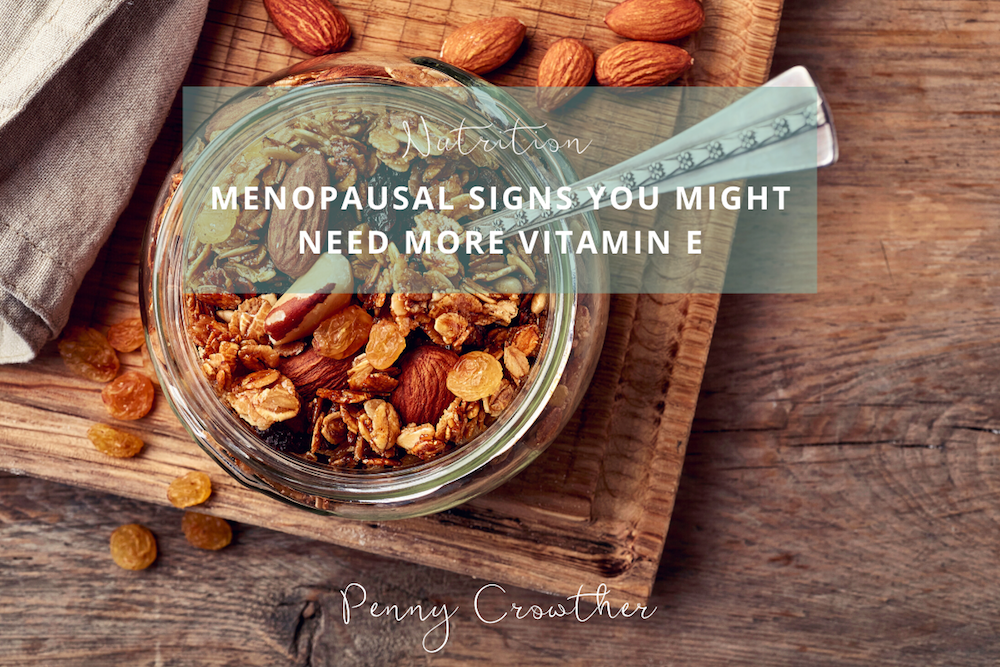
Are you deficient in Vitamin E?
Do you have any of these health issues, all of which are common leading up to and during the menopause?
- Hot flushes
- Dry Skin
- Dry or thinning hair
- Age spots
- Decreased libido
- Memory & concentration problems
- Catch colds and viruses easily
- Leg cramps
- Bruise easily
If the answer is yes, you may need more vitamin E.
How to get more vitamin E
A study in 2012 found that over three quarters of Britons and Americans were obtaining less than the minimum government recommended daily intake of vitamin E.
So which foods provide most vitamin E? The best dietary sources are seeds, nuts, vegetable oils and avocado. Light and air destroy vitamin E so if you plan to get your vitamin E from vegetable oils such as sunflower oil, be sure to buy it in a dark coloured glass bottle.
The recommended daily intake of vitamin E is 15mg (22 iu). To obtain that amount in one day you would need to eat, for example, one tablespoon (uncooked) sunflower oil, 23 almonds and 2 tablespoons peanut butter or an avocado. Low fat diets, which are still popular are at high risk of being vitamin E deficient.
What Are the Benefits of Vitamin E?
As it has an anti clotting effect on the blood, vitamin E is particularly helpful for heart health. With the decline in oestrogen during the menopausal years, goes an increased risk of heart disease.
Vitamin E is a powerful antioxidant. This means it protects the body from oxidation which occurs continuously through normal processes such as breathing, digestion, energy production, immune function, hormonal activity and the detoxification of harmful substances such as alcohol, drugs or pollution. These processes all produce destructive substances known as free radicals. Oxidative stress, which accelerates ageing and chronic disease, occurs when antioxidant supply in the body is insufficient to destroy the number of free radicals being produced.
Another important function of Vitamin E is its effect on immunity, particularly in relation to infections. For example, in elderly people, higher levels of vitamin E in the blood correlated with a reduced number of viral infections over a 3 year period.
Should I supplement Vitamin E?
Vitamin E is not easy to obtain in plentiful amounts in the diet as you have seen. However the answer to the question of whether you should take vitamin E supplements is not a simple yes or no! Nothing is ever simple is it?!
If you are thinking of supplementing, it is best to consult a nutritional therapist such as myself. I can make sure your supplement programme is balanced, not interracting with medications and is tailored to your particular needs. Drop me an email penny@nutritionistlondon.co.uk
What you need to be cautious of with vitamin E supplements
It is very important to bear these points in mind:
- Vitamin E interacts with certain medications, including those for heart problems. If you are on any medication, particularly for high blood pressure or cholesterol and cardiovascular issues, you need to check first
- The type of vitamin E you supplement is very important. Vitamin E is not actually a single vitamin, but a group of fat soluble vitamins known as tocopherols and tocotrienols.
- There are eight naturally occurring forms of vitamin E, which are the alpha, beta, gamma and delta forms of tocopherol and tocotrienol. In most studies that have not shown favourable results with vitamin E supplementation, only tocopherol is used rather than a mixture of tocopherols and tocotrienols. Moreover, a synthetic version known as DL- Alpha tocopherol is commonly used, instead of the natural form and it appears to have toxic effects.
- To get the most benefit from vitamin E supplements always look for mixed tocopherols and tocotrienols. It makes sense to include a mixture of the different forms rather than take one, such as alpha tocopherol (even if in the natural form) in isolation, in case it causes an imbalance of the other (beta, gama, delta) tocopherols and tocotrienols.
- Synthetic vitamin E (written on labels as dl-alpha tocopherol rather than d‑alpha-tocopherol) is definitely to be avoided.
How to improve absorption of vitamin E
Taking your vitamin E with some healthy fat such as coconut yoghurt, avocado or nut butter will enhance it’s absorption and use in the body. Vitamin E works best in tandem with vitamin C, so make sure your supplement contains some vitamin C as well.
References
Troesch B1, Hoeft B, McBurney M, Eggersdorfer M, Weber P. Dietary surveys indicate vitamin intakes below recommendations are common in representative Western countries.Br J Nutr. 2012 Aug;108(4):692–8.
Chavance M, Herbeth B, et al., Vitamin status, immunity and infections in an elderly population.. 1989; 43(12):827–835.
Wiser J, Alexis NE, Jiang Q, et al, In vivo gamma-tocopherol supplementation decreases systemic oxidative stress and cytokine responses of human monocytes in normal and asthmatic subjects. Free Radical Biology & Medicine. 2008. 1;45(1):40–9.
Saliha Rizvi, Syed T. Raza et al., The Role of Vitamin E in Human Health and Some Diseases. Sultan Qaboos Univ Med J. 2014; 14(2): e157–e165.
Mangialasche F, Westman E, Kivipelto M., et al., Classification and prediction of clinical diagnosis of Alzheimer’s disease based on MRI and plasma measures of α-/γ‑tocotrienols and γ‑tocopherol. 2013;J Intern Med. 273(6):602–21.
Pavlik VN, Doody RS, Rountree SD, Darby EJ, Dement Geriatr Cogn Disord: Vitamin E use is associated with improved survival in an Alzheimer’s disease cohort.2009;28(6):536–40.
Singh I, Turner AH, Sinclair AJ, Li D, Hawley JA. Effects of gamma-tocopherol supplementation on thrombotic risk factors. Asia Pac J Clin Nutr. 2007;16:422–8.
